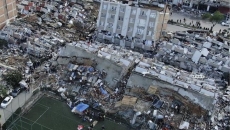The federal government has stopped shipping rapid COVID-19 antigen tests to provinces as millions are set to expire within the year, and experts say the once-essential tool has lost its importance in the pandemic.
There are 90 million rapid tests in the federal inventory, Health Canada said in an email. About 80,000 of those are set to expire within six months and 6.5 million within the year. The rest expire within two years.
“Canada has robust inventories and is well prepared for COVID response,” Anne Génier, with Health Canada, said in an email.
Ottawa has ordered more than 811 million rapid tests since the beginning of the pandemic with a price tag of about $5 billion. About 680 million of those went to provinces and territories.
As the fourth wave of the pandemic gripped the country near the end of 2021, every region was trying to get as many of the tests as possible. Hospitals were overwhelmed in many provinces and the rapid antigen tests became a critical part of the response.
Mahesh Nagarajan, a professor at the University of British Columbia’s Sauder School of Business, said it’s a different situation two years later.
“I don't think we should be buying any more of them right now,” Nagarajan, whose focus area is on supply chains, said in a recent interview.
Nagarajan said Canada now has several qualified and dependable suppliers for the tests. The government has established standing offers with the companies for the supply and delivery on an as-needed basis
Health Canada said the decision to end shipments at the end of January was made in collaboration with provinces and territories, as the regions have enough supply.
On top of the federal stockpile, provincial health authorities said theyhave millions of tests.
British Columbia has 28 million tests, with more than four million to expire within six months.
Quebec has 63 million tests, Alberta has 47.5 million, Saskatchewan has 6.4 million, Manitoba has 11 million, Nova Scotia has about 8 million and Newfoundland has about 2.5 million.
Nearly every region said they have so far not destroyed or repurposed their rapid antigen tests, because Health Canada extended the expiration date for many brands. They did not explain an expected cost or strategy if the tests expire before being used.
The time frame left for the tests differs depending on the brand,but Health Canada has approved 19 extensions of shelf life ranging from six months to two years.
The chemical components in the tests degrade over time, Nagarajan said, so he has concerns.
"Rapid antigen tests to begin with are not the most accurate," Nagarajan said. "Now you are extending their lifespan?"
Nagarajan said every country has stockpiles, but it’s important Canada learn from the pandemic procurement process.
A lack of co-ordinated policies across the country made it hard to estimate how many tests would be needed. It was a "recipe for high inventories," Nagarajan said.
Nazeem Muhajarine, a professor of epidemiology at the University of Saskatchewan, said he estimates that for every five tests given out by provinces and territories during the pandemic there are two tests sitting in a warehouse.
He said Canada needed to procure as many tests as it could when they were available.
"We have to have a plan — that's key."
Muhajarine said it is difficult to know how important the rapid antigen tests will continue to be, because there is very little communication now about COVID-19, let alone government plans to address challenges the pandemic may still bring.
"That communication has really fallen off precipitously,” he said. “Nobody is talking about COVID, certainly not talking about where to get tests if they need one."
Having large stockpiles of rapid antigen tests may not be useful, especially if the virus shifts and becomes less detectable on the devices, said Dr. Anna Banerji, an infectious disease specialist at Dalla Lana School of Public Health and Temerty Faculty of Medicine at the University of Toronto.
"Even at the best of times there are limitations on the testing,” she said.
What is important is the ability to quickly produce or procure them, she added.
Banerji said, in her opinion, people are using rapid antigen tests less because there is no longer a public health strategy to deal with COVID-19. She said people aren’t wearing masks and, in most instances, there is no isolation policy if someone actually tests positive.
If you know you have COVID-19 and don't do anything about it, there's no point, she said.
"Right now, there is no strategy. We are not looking at numbers. We don't know how much COVID is out there,” she said.
"What difference is (testing) making now?"






